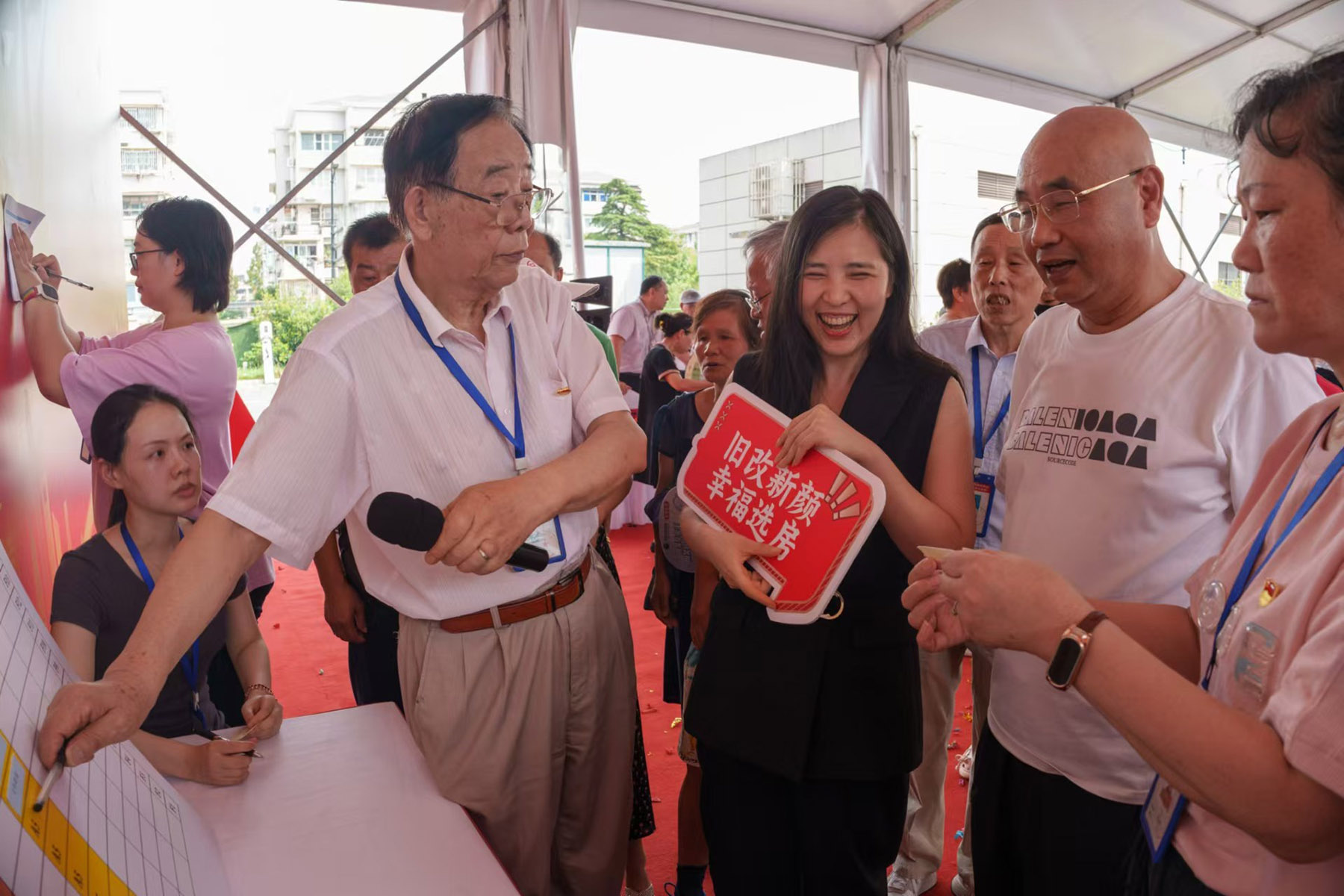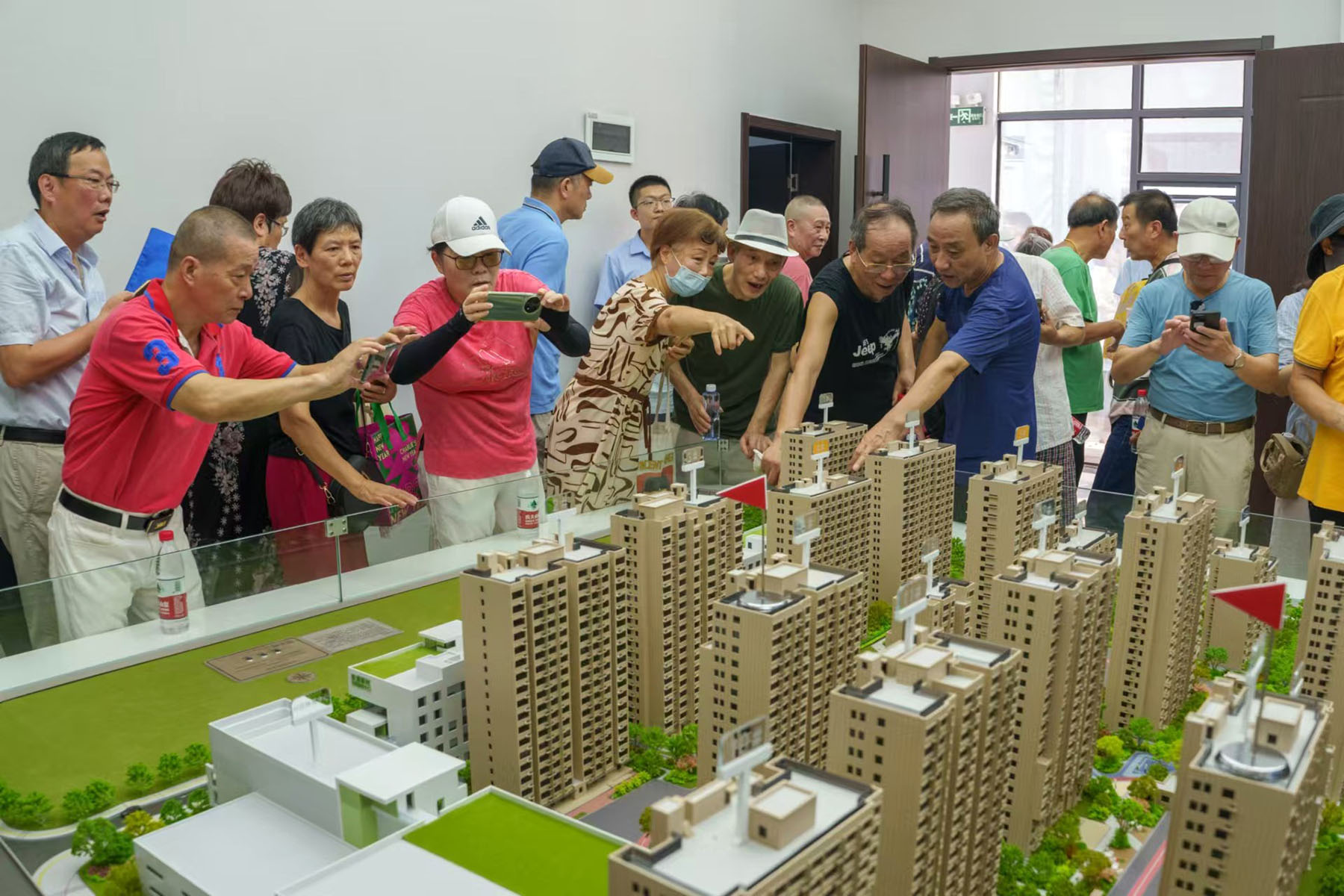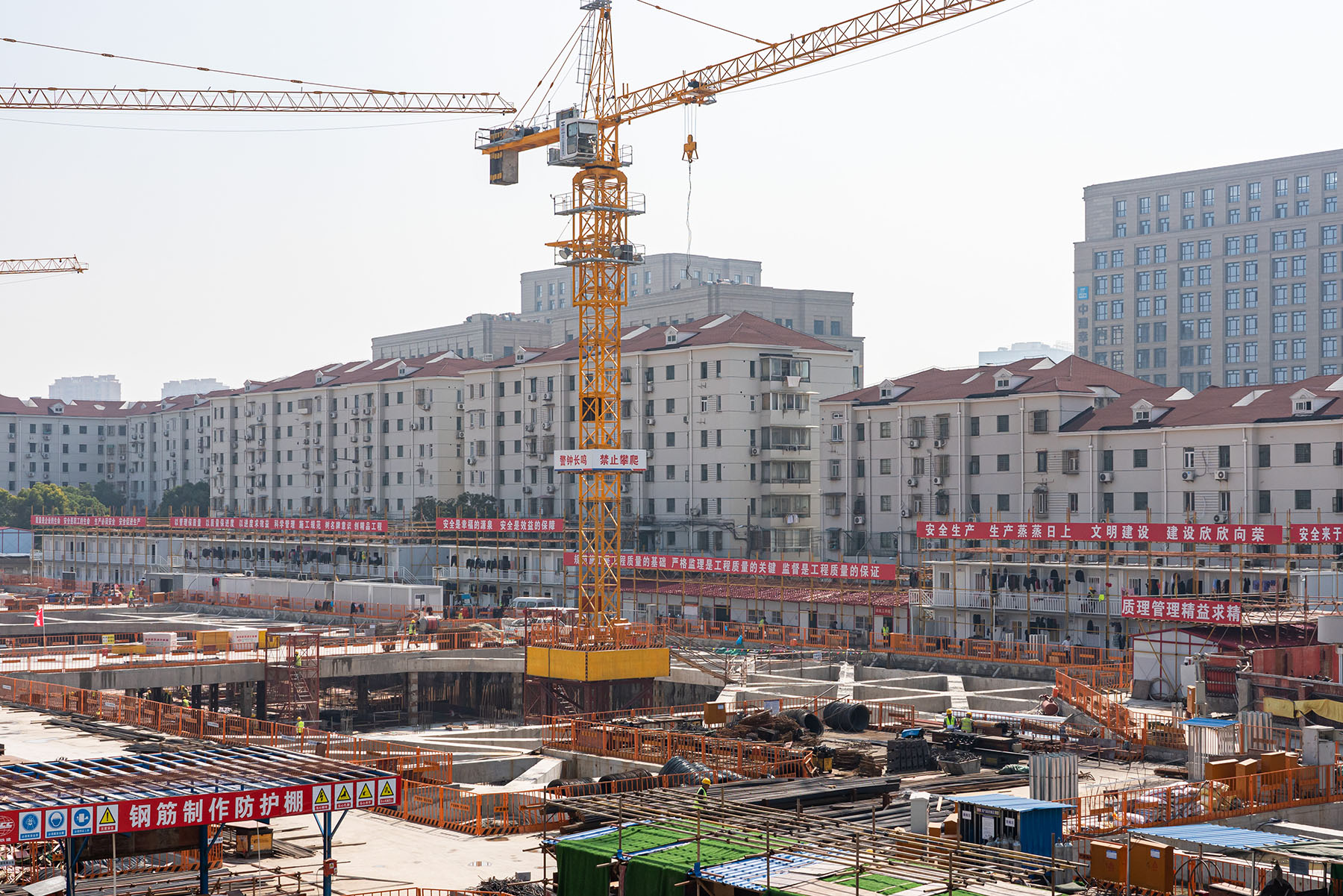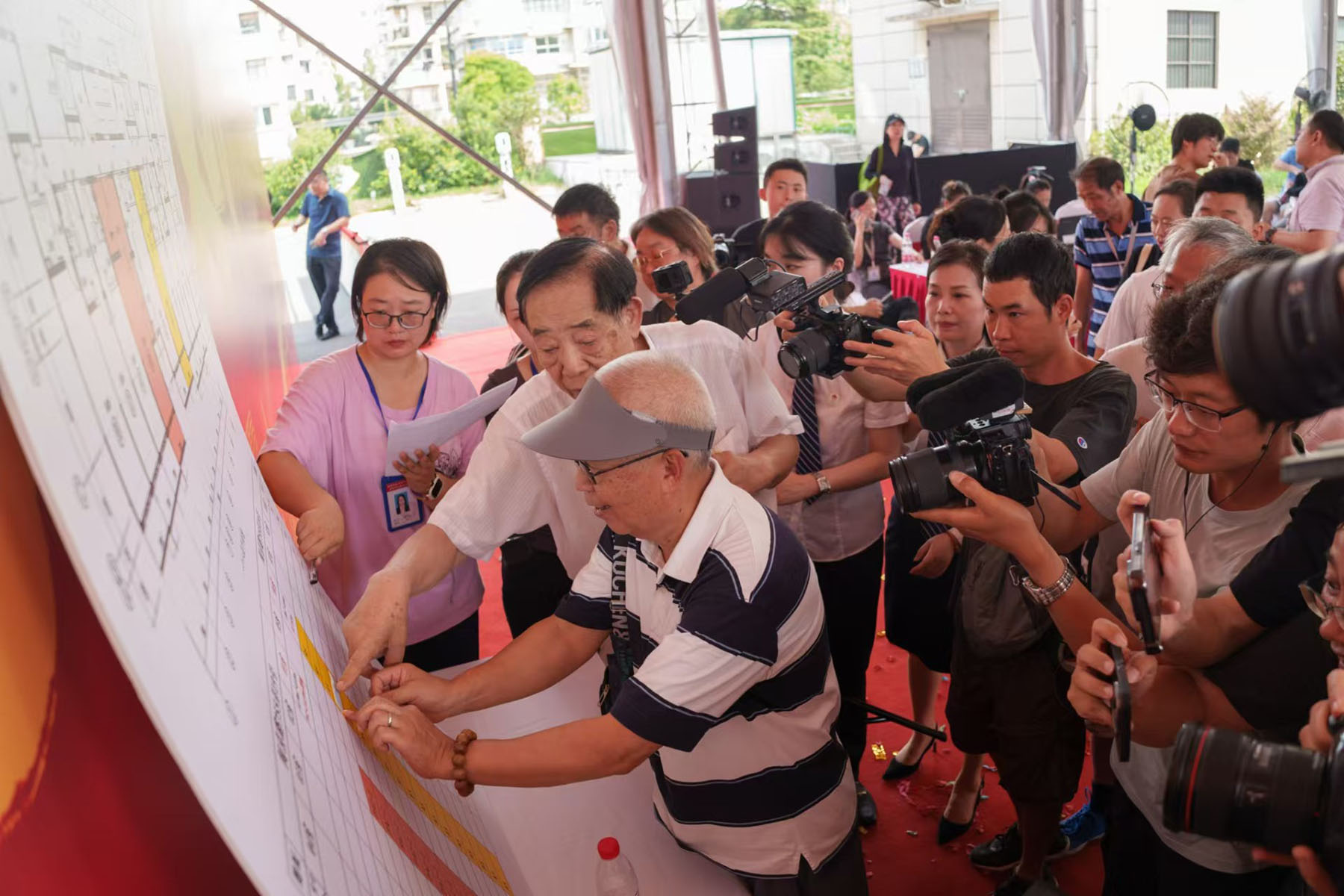Mass regeneration projects move residents from tiny rooms with shared bathrooms and kitchens to modern apartments

Bao Jialong was ecstatic after drawing the No 1 ball in a lottery on Sept 2 to determine who would be first to choose which floor they'd live on in a newly built 18-story residential building in Shanghai.
The 72-year-old, whose ball was among those of 10 households of Pengpu New Village in the lottery, couldn't hold back his excitement.
In the end it was the 15th floor that became his first choice, as Bao believed the floor had the perfect combination of view, sunlight, water and good air quality.
Such lotteries have become commonplace in many urban villages in Shanghai, as the city seeks to regenerate its older urban areas and place residents in housing that is up to modern standards.
Bao's household was among 100 others that would be moving from old and dilapidated buildings, often with shared kitchens and bathrooms, into a shiny new apartment building fitted with the latest mod cons.
READ MORE: China steps up investment in urban renewal projects
Some 2,100 households from Pengpu No 1 Village will be relocated into new accommodations shortly, according to local officials. For Bao, he and his wife had spent the past 20 years living in a space of 13 square meters with a shared bathroom and a space for cooking shared with two other families living on the same floor. The outdated compound was built in the 1950s.
The Jing'an district government's plan to revamp the residential compound, which failed to meet people's living needs, began in 2019. They decided to tear down the 40 smaller residential buildings and replace them with 17 apartment blocks. The residents moved out in autumn 2021, and are scheduled to get the keys to their new homes in the first half of next year.
"I climbed up to an overpass and looked at our new apartment buildings this morning. The residential compound looks nothing like the one before. I feel so excited and lucky. I never expected that our living quality could be changed like this," said Bao.

Shanghai's efforts of urban renewal and improving people's living quality have gathered pace in recent years. The city announced it aims to complete its plan to renovate old residential buildings, especially those without independent bathrooms and kitchens, by 2025. The project covers 2.8 million sq m of residential property.
Since last year, nine renovation projects have gotten underway in the city's Yangpu, Huangpu, Jing'an, Xuhui and Hongkou districts, benefiting 10,000 households.
In Jing'an, Pengpu No 1 Village is the district's last large-scale residential renovation project, an endeavor that has been ongoing since 2005.
In the early years, the district added new floors to existing buildings, but there were limits to this approach as the living environment remained poor, said Wang Yanfeng, deputy director of the Jing'an District Housing Administration.
"So later we altered the method to tearing down the old buildings and reconstructing new ones at the original sites. In 2007, Pengpu No 3 Village became a pilot project where the buildings were torn down and new ones were built. Thousands of households benefited, and they moved in two years ago," said Wang.
"The smooth process of the project in Pengpu No 1 Village is a landmark of Shanghai's urban renewal process. This project involves the largest number of households and the most complexity in terms of room sizes and room types," he said.
Ren Wei, secretary of the Party working committee of Pengpu New Village subdistrict, said that relevant government departments from more than 50 cities in the country have visited to learn from their practice. Some government visitors have even been from overseas, including those from Japan and Tunisia, he said.

Old way of life
In its early years, Pengpu No 1 Village was a residential area where only role models and outstanding workers could live. However, as time went by, life at the residential compound became poor, squeezed and outdated.
"Paint peeled off the walls. Stairs and much of the public space were in disrepair. It was worse on rainy days, as the ground flooded almost immediately. Roofs leaked and many of our rooms would be flooded," said Bao.
Many residents stacked their belongings in the corridors as the space in the rooms was limited. "The corridors were always overflowing with wash basins, old books, cardboard boxes and bicycles, and it was hard to squeeze by and walk through," he said.
The worst part of life there was that the three families on the same floor had to share a bathroom and a cooking space.
"There once lived a total of 14 people in the three rooms, and we had to line up to use the toilet in the morning. It was a total disaster and triggered quarrels quite often," he said.
Xin Tieniu, a 74-year-old resident who had lived in a 20-sq-m room in Pengpu No 1 Village with his family for more than two decades, said he'd often want to move away but soaring housing prices left him with little chance.
"Living quality used to be really poor, not to mention there being no sense of well-being," he said.

Adding happiness
In the new buildings, each household will move into an apartment with a bedroom that is at least 2 sq m larger than their original ones. Within the apartment, there will also be other space of at least 10 sq m for a bathroom, a kitchen and a balcony.
"We really appreciate the government's efforts to improve living quality for us. We'll be living in new buildings with lifts and brand-new infrastructure and surroundings. We feel very grateful and happy," said 68-year-old Yu Cunguo, who once lived with five other family members in two rooms totaling 25 sq m in the old residential compound.
In the new apartment complex, there will be public facilities, including a canteen for the elderly, community activity rooms, reading rooms, a sports center and a nursing home.
Working with architects, the subdistrict authorities have tried their best to help residents increase their sense of happiness.
"For example, in the original buildings there were as many as 282 room types. The smallest room was 7.2 sq m, while the largest was over 100 sq m. It took two months for our workers to measure and calculate the size of each residence," said Ren.
ALSO READ: 'Building blocks' pile up for urban renewal, better livelihoods
The calculation was really hard work, he said. In some cases, four households shared a bathroom. While in some others, as many as eight shared one. Differences also lay in that some had independent or shared balconies and storage rooms, while others did not.
"We held discussions with residents multiple times so that they would feel what they were given in the new buildings was good and fair," Ren said.
Regarding the design of the apartments, the district authorities frequently collected ideas from residents to ensure their needs were met. For example, it was requested that there be windows in each section of the apartment, including the kitchen and the bathroom, and that all the bedrooms must have good sunlight.
"It took us 12 months to come up with the final design of all the apartments after revising the plans more than 20 times. The final design was accepted by all the residents," said Ren.
Sports enthusiast Xin is already imagining his new life in the new building — with an elevator and a sports center.
"Our residential compound is in a very good location. It's just next to the Pengpu New Village metro station, so it will be convenient to get around," he said.


